FW
Fortum, a major European energy company building new business options in the circular economy, along with the sustainable fiber technology company Spinnova are showcasing the world’s first clothing made from agricultural waste, namely wheat straw, at the Textile Exchange Sustainability Conference in Vancouver, this week.
The showpieces include a knitted t-shirt, as well as a jacket and skirt made of a woven fabric on organic cotton warp. The prototype material is unique also due to its extremely low environmental impact from raw material extraction, processing and manufacture, verified by life-cycle analysis (LCA).
Spinnova’s technology, presently in a piloting phase, turns micro-fibrillated cellulose (MFC) directly into fiber mechanically without any dissolving or harmful chemical processes. Fibers of the now showcased clothing were produced at Spinnova’s pilot facility in Finland, which also means that Spinnova’s technology can be applied to various biomasses without further technology development. Now Fortum and Spinnova plan to establish sustainable fiber production at Fortum’s future biorefineries that will use residual biomasses such as agro waste.
The biomass will be processed into materials for bioproducts of lignocellulosic origin, as well as cellulosic products. The refineries will be based on fractionation technology, enabling highly resource-efficient utilisation of wheat straw and resulting in significantly lower environmental impact compared to other processing technologies.
A belt and road forum was held in China, September 29, 2019.
More than 200 people from over 20 countries along the belt and road attended the conference and discussed the new opportunities for international textile cooperation and the new trend of global textile economy development under the belt and road initiative.
The forum reviewed the trade and investment cooperation between China’s textile industry and countries along the belt and road, and summarised the overall situation, and key areas of China’s textile industry in terms of international cooperation. A representative from Iran’s textile industry introduced the development history and current situation of the Iranian textile industry, highlighting the rapid development of Iran’s textile and apparel trade after the proposal of the initiative. The forum was aimed at bringing more thoughts and enlightenment to the future development of the world textile economy, and creating opportunities for multi-field integration, multi-party economic and trade activities and high-quality resource sharing in the industrial chain and effectively promoting international cooperation and development to achieve a win-win situation in Asian textile cooperation.
Under belt and road, China is attempting a deep integration of international and domestic markets as well as a more suitable overseas investment environment.
Bangladesh Denim Expo will be held from November 5 to 6, 2019.
The world’s leading denim trade shows will host around 100 exhibitors from 11 countries, including Bangladesh. Other participating countries include China, Japan, Italy, India, Singapore, Brazil, Spain, Pakistan, Turkey, and Germany. Through a series of product displays, presentations, seminar sessions, and panel discussions, the expo will encourage healthy debate and interaction among exhibitors and visitors to champion a more responsible denim industry. The focus is on sustainability and within this the issue of responsibility – an overriding theme of this year’s event.
Bangladesh is now the world’s largest producer of denim and leads the way in terms of addressing some of the sustainability challenges related to denim production, including excessive use of water and chemicals. Each expo marks continued and gradual progress being made by the more progressive players in the industry.
The Sustainable Apparel Forum will be held alongside the expo. The forum will see more than 50 speakers from Bangladesh and overseas, sharing expert opinions across five panel discussions covering current issues about the country’s apparel industry. These include human resources, transparency in business, water conservation, purchasing practices, sustainable chemical management, waste management, circular economy in textiles, and climate change, to name a few.
Lenzing Group recently upgraded its Refibra technology with 30 per cent more usage of recycled raw material to further drive circular economy in the textile segment. This new offering adds it up in the family of Tencel™ Lyocell fibres with low fibrillation properties.
The new fibers are 100 per cent biobased and manufactured using eco-responsible closed loop production process. They are made using a new technique that shows low fibrillation and moisture management properties with improved breathability, smoothness and strength. The fiber has its applications in denim, athleisurewear, apparel and home textile and with this it has expanded its offering as a sustainable alternative for knitwear, lingerie and towels.
The low fibrillation property of the fibers maintains the smoothness of the fabric even after multiple washes. Also, similar to the other Tencel™ Lyocell fibers the Refibra technology is capable of saving tonne of cotton scraps from being dumped into the landfill, by blending 30 per cent of pulp made from recycled cotton scraps collected from the garment manufacturing units. These sustainable fibers leave least impact on the environment, reusing water and solvent at a recovery rate of more than 99.5 per cent.
Moreover, an additional feature includes a special identification technology that increases the transparency confirming the fibre origin. Tencel™ Lyocell fibres with REFIBRA™ technology are identifiable in yarn, fabrics and final garment stage, which not only improves the supply chain transparency, but also gives brands an upper hand in confirming the sustainability of their fibres to the customers thereby increasing the brand trust.
Indian exhibitors are pleased with the turnout of overseas buyers at the 48th edition of IHGF-Delhi fair. The fair is being held from October 16-20, 2019 at India Expo Centre & Mart in New Delhi.
First time visitors to the show Omaya Sisemore of Earths’s Treasures from USA and Antoinette Stander from South Africa were surprised to see a large variety of Indian products on display by over 3,200 Indian exhibitors.
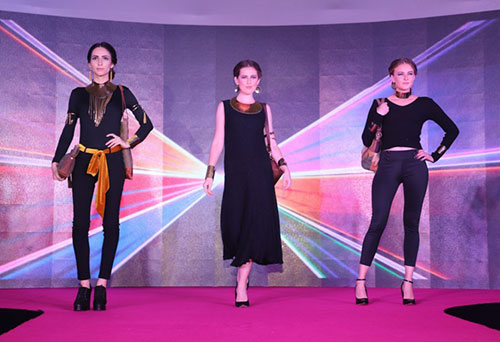
Similarly, Jesica Wilson from USA who has been visiting this show for the last five years noted that this edition focused more on the Reuse and Recycle theme to increase environment consciousness in India. She also said confirmed her visit to the next edition of the fair that will be held from April 15-19, 2020.
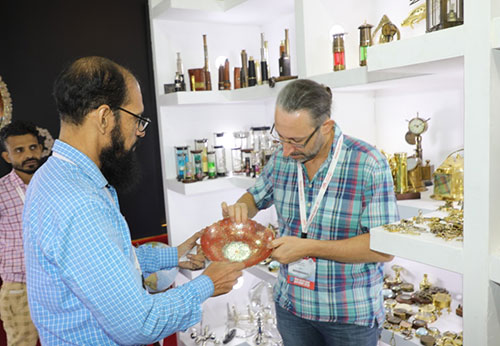
Another buyer from UK, Susan Redford was visiting the show for the 26th time in the last 20 years. She purchases accessories, home décor, gifts, furniture and incense for her company Namaste Ltd from the fair. According to her, the fair has got better with time as it keeps introducing new initiatives every year.
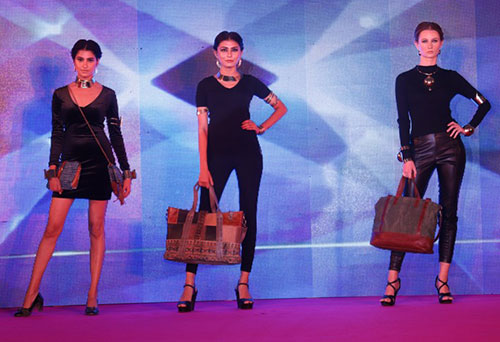
One of the main attractions of the fair included a fashion show on second day. This show had models walking on the on ramps displaying attires, fashion jewellery and accessories contributed by the exhibitors such as Krocks Jewellery, Oriental Exports, Sia Crafts, Vinayak Exports, Kenway Sartaj.
 Tokyo-based Image Magic has expanded its longstanding digital direct-to-garment capabilities by installing two Kornit Avalanche Poly Pro systems. The move supplements Image Magic’s continuous development of internal efficiencies, and increases its capacity for an operation that has observed 40 per cent year-over-year growth.
Tokyo-based Image Magic has expanded its longstanding digital direct-to-garment capabilities by installing two Kornit Avalanche Poly Pro systems. The move supplements Image Magic’s continuous development of internal efficiencies, and increases its capacity for an operation that has observed 40 per cent year-over-year growth.
Using the eco-friendly NeoPigment™ Olympia ink set, Kornit Avalanche Poly Pro was developed to extend digital design complexity, color gamut, and durability to polyesters, which have grown in popularity as a result of sportswear and ‘athleisure’ trends. It is the first digital direct-to-garment print system developed specifically for such materials.
Kornit Digital develops, manufactures and markets such industrial digital printing technologies for the garment, apparel and textile industries. The company delivers complete solutions, including digital printing systems, inks, consumables, software and after-sales support. It caters directly to the changing needs of the textile printing value chain. Kornit’s technology enables innovative business models based on web-to-print, on-demand and mass customisation concepts. With its immense experience in the direct-to-garment market, Kornit also offers a revolutionary approach to the roll-to-roll textile printing industry: The brand serves a mix of corporate clients, including some of Japan’s leading apparel brands, and general consumers via a predominantly internet-based sales model.
"Digitisation is taking the fashion industry by storm with many fashion e-commerce companies achieving the unicorn status in the industry. A prominent example of this is the Singapore-based privately held e-commerce start-up Zilingo which is digitising the entire fashion supply chain by unifying the HR systems, logistics APIs and operating systems of over of its 4,000 sourcing partners across the world. This has helped the company to reach $1 billion revenues in a short period of time."
 Digitisation is taking the fashion industry by storm with many fashion e-commerce companies achieving the unicorn status in the industry. A prominent example of this is the Singapore-based privately held e-commerce start-up Zilingo which is digitising the entire fashion supply chain by unifying the HR systems, logistics APIs and operating systems of over of its 4,000 sourcing partners across the world. This has helped the company to reach $1 billion revenues in a short period of time.
Digitisation is taking the fashion industry by storm with many fashion e-commerce companies achieving the unicorn status in the industry. A prominent example of this is the Singapore-based privately held e-commerce start-up Zilingo which is digitising the entire fashion supply chain by unifying the HR systems, logistics APIs and operating systems of over of its 4,000 sourcing partners across the world. This has helped the company to reach $1 billion revenues in a short period of time.
In future, the company also plans to incorporate transparency programs that will give it a direct oversight of quality-control issues at the factory level through the provision of real-time data. By using proprietary quality-control modules, the company’s line managers will use connected tablets and a heat map to detect problem areas in their products.
Technology drives growth in apparel companies
Zilingo is thus symptomatic of the rapid advances reshaping the sourcing and apparel industries with tech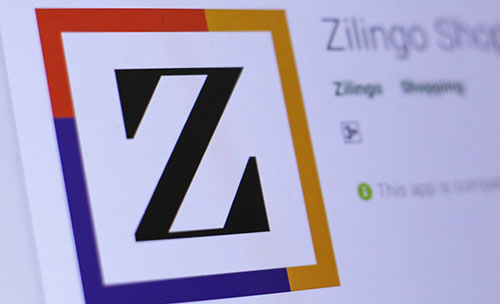 companies driving the change. Signs of this shift was evident at this year's ‘Sourcing at One Magic’ event, hosted in Las Vegas recently. Many companies attending the event were looking for new ways to navigate the volatility caused by the recent tariff hikes, improve their delivery times and be more sustainable by harnessing the value of big data.
companies driving the change. Signs of this shift was evident at this year's ‘Sourcing at One Magic’ event, hosted in Las Vegas recently. Many companies attending the event were looking for new ways to navigate the volatility caused by the recent tariff hikes, improve their delivery times and be more sustainable by harnessing the value of big data.
Like Zilingo, the growth of New York-based The Ohzone, has also been driven by the rise of e-commerce platforms and the race to deliver ever more effective online visual search technology in the clothing sector. The fashion technology company specialises in the creation of precise 3-D, zoomable models of real garments. These can be used to market the garment on the Shopify e-commerce platform, as well as to test outfits and change out elements without the need for any inevitably wasteful sampling. The company plans to push the digital apparel envelope further by creating digital-only clothing.
Digital closets gain popularity
The idea of creating a digital closet is rapidly gaining ground with many designers producing photo-realistic, digital-only collections. A prime example of this is the Scandinavian retailer Carlings, with its digital tailors manipulating its client's photos so it appeared that they were wearing the company's limited-run finery – and all at a very real world $30 per piece. Similarly, Moscow-based fashion influencer Daria Simonova modeled her Carlings'3-D collection to her 56,000 followers on Instagram, with her photo of a puffer jacket paired with lightning bolt-embellished jeans notching up more than 4,700 likes.
The power of mobile games
One way brands can leverage the potential of digital closets is through mobile gaming. For instance, Glu Mobile's Covet Fashiongame enables players to style their models in digitally rendered clothing and accessories – brought in $53.4 million in sales last year. Similarly, San Francisco-based company's Kim Kardashian: Hollywood game, allows users to dress an avatar – presumably an amply derriered one – in designer garments, has generated more than $240 million in sales since it was launched in 2014. Meanwhile, the first digital couture dress – created by The Fabricant, an Amsterdam-based fashion label – fetched $9,500 at auction in May.
Digital designerwear is thus on its way to become the next fast fashion with the apparel industry dramatically upping its uptake of IT engineers.
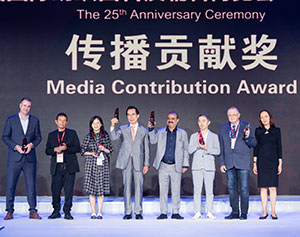 FashionatingWorld, the leading global network of webplatforms, steered by DFU Publications, was graced with Media Contribution Award at the Intertextile Shanghai Apparel Fabrics show in Shanghai. The global media company that has been associated with Intertextile Shanghai events for a long time.
FashionatingWorld, the leading global network of webplatforms, steered by DFU Publications, was graced with Media Contribution Award at the Intertextile Shanghai Apparel Fabrics show in Shanghai. The global media company that has been associated with Intertextile Shanghai events for a long time.
Sanjay Chawla, Global Convener, Publisher & Editor in Chief received the awards among few other media dignitaries. This comes as a high recognition being conferred by the biggest apparel fabrics exhibition in the world.
Intertextile Shanghai Apparel Fabrics celebrated its 25th anniversary on September 25, 2019, The trade show awarded leading industry players, experts, trade bodies , exhibitors as well as buyers , who have had a prominent association with Intertextile Shanghai exhibition, all these years.
Polartec, a provider of sustainable textile solutions, has unveiled the iconic, American-made, military-issue fabric technologies and finished garments, for Americans. Available directly from the source, these authentic Polartec fabrics and designs are shipped directly from the same US cut and sew manufacturers that have been creating these garments since 2007.
The foundation of the brand’s Gen III Extended Cold Weather Clothing System (ECWCS) is its Polartec Military Issue Collection. This ECWCS system provides soldiers with a multi-layered, performance driven clothing system that is designed to be versatile and adaptable to varying operational and environmental conditions.
For more than a decade there have been Gen III ECWCS labelled military garment designs for sale online and from select military retail stores. While some of these items are authentic surplus garments, it remains an unregulated grey area. Foreign imitations continue to pop up in their various forms, and even outdoor sporting and hunting brands have adopted military issue garment nomenclature into product descriptions.
Now available directly from the source, these authentic Polartec fabrics and designs are made in America and shipped directly from the same US cut and sew manufacturers that have been creating these garments since 2007.
Japanese Company Uniqlo plans to launch its third store in Madrid, Spain. The brand currently operates two stores in Barcelona. It will open its Madrid store three years after it forayed into the Spanish market. The store will be located in the former El Jardin de Serrano shopping mall and span over 1,500 sq m and is located in the former El Jardín de Serrano shopping mall.
The company plans to open this department store in partnership with El Corte Ingles, one of the largest fashion distributors in Spain and the main stop for international operators who want to gain insight in the country. In 2017, the group’s revenue was 4.9 billion euros with this sector, above what Inditex entered in Spain in the same year.
Together with groups like Levi’s, Ralph Lauren or Esprit, which rely on department stores in their international expansion, or luxury brands such as Dior, Bottega Veneta or Dolce&Gabbana, in El Corte Inglés also operate brands that, like Uniqlo, concentrate the bulk of its distribution in retail.












